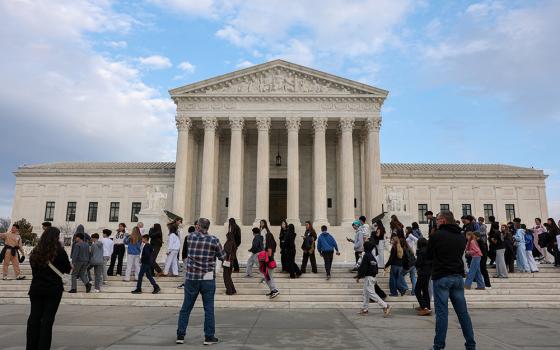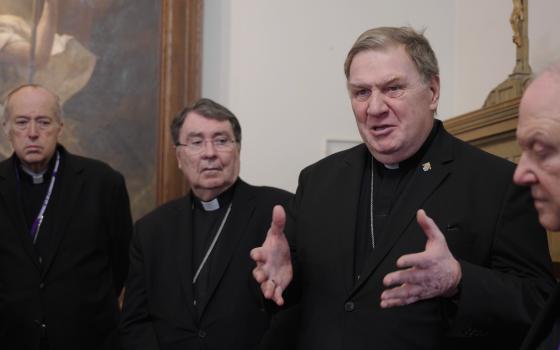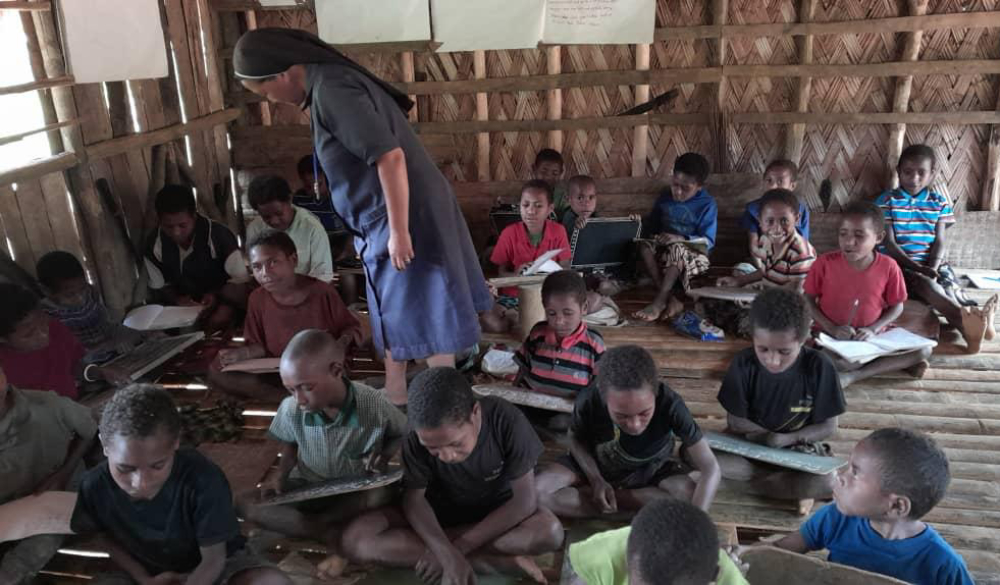
The Cluny sisters offer literacy and education programs for local children in Papua New Guinea. Education was unavailable when the sisters first arrived, so they started a school. Once the students were ready, they were trained as teachers, and they now teach in the 12 schools. (Courtesy of Sylvian Aua)
When our congregation, the St. Joseph Sisters of Cluny, arrived in Papua New Guinea 54 years ago, our first mission was at Kanabea, one of the most remote regions of the country. Today, we are still here, engaged with the population of about 1,000 people in the village and 30,000 in the region. It is a place of river deltas and swamps, surrounded by mountains and dense forests. The altitude of 4,500 feet means we are often immersed in heavy fog, and it can sometimes be several months before anyone can come in from the outside, or we can get out.
The climate and terrain of Papua New Guinea have isolated groups from each other, which has allowed the development of many languages. Having been a colony of England, however, English is the national language. But to accommodate this language diversity, most groups use Pidgin English.
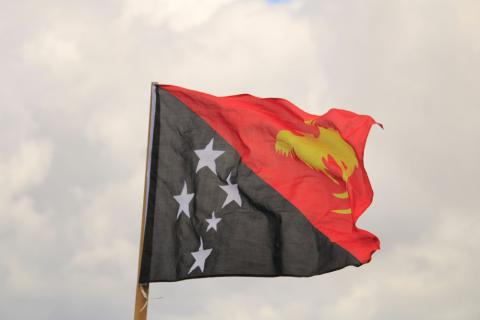
(Unsplash/Spencer Wungin)
Our community in Kanabea includes three missionary sisters from India, two professed and one in temporary vows. When our sisters first arrived, education was unavailable, so the sisters began a school. When some of the students were ready, they were sent for teacher training, and they now teach in the 12 literacy schools.
Sr. Pia is the coordinator for these 12 literacy schools in the region and offers in-service training to teachers and to the local village catechists. She travels on foot from village to village, often taking 10-13 hours to reach a school, accompanied by some of the villagers. The closest school to Kanabea is a three-hour trek away. On Sundays, she walks to several outstations of our parish to conduct Communion services. Even here in our parish, when the priest is away, she holds a Communion service. People are happy because they're not deprived of holy Communion and often ask when Sr. Pia will come. Sometimes, I give the homily and she does the rest. Otherwise, the people will lose their faith.
I work with girls who stay in our boarding house in Kanabea and attend secondary school, which is not accessible from their villages. Providing a place for these young women to stay is also for their protection because violence against women in Papua New Guinea is said to be among the worst in the world.
We have 32 to 33 girls at our boarding house who we love and care for, and make sure they complete their studies so they can become someone in the future. Every Wednesday, I spend one to two hours with them. Most of their parents come to thank us because their girls are doing well. Sometimes, boys come looking for them, but we protect them. Our girls don't have any problems here.
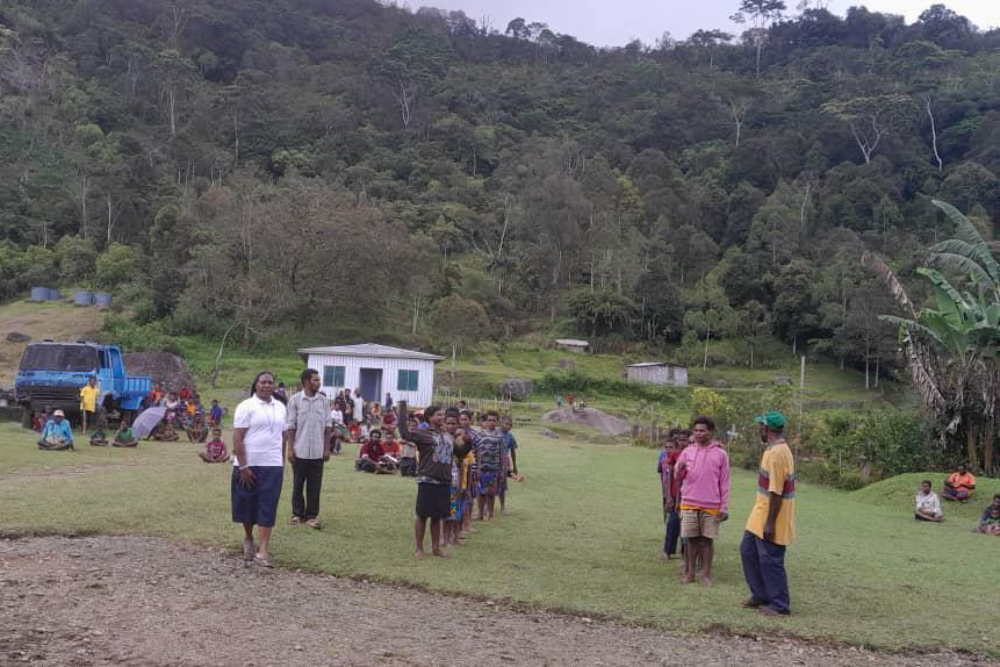
Sr. Shiny, a nurse, visits patients at one of the Cluny sisters' health clinics in Papua New Guinea. Electricity and water access are not always available, and the mountainous environment makes it difficult for people far from the clinic to access services. (Courtesy of Sylvian Aua)
Being in an isolated place like this is challenging. We used to have a plane, but it was lost in an accident. For three years, we haven't had a plane, and there is no network coverage either. We must walk to places to use the internet and eat whatever we can. Buying things and getting food is difficult because it's a three-day walk to reach the town. All I bring with me is a blanket. Sometimes, I feel like giving up because there's no communication or transport, and we want to do more for the people here.
Some of our sisters live in Bema, a small, remote village in the Kerema Gulf Province. The majority of the people there, as in most of the country, are small subsistence farmers. However, because the nearest town is Kerema, and the few roads are often impassable due to rain and mudslides, they cannot take their produce there to sell. It is frightening to walk on those roads during the rainy season and we give them money and tea when we can. They don't live in one place and build houses where they feel comfortable.
There are six sisters in Bema; four are from India and teach in the local high school, and two are from Papua New Guinea and also teach. Sr. Shiny is a nurse and works in the Catholic health clinic. On weekends, the school sisters also extend their ministry to the local area. They visit families and elders and teach catechism to children and adults.
Advertisement
As in Kanabea, there are many limitations to providing health care in Bema. Electricity and water access are not always available at the health center, and the mountainous environment makes it difficult for people far from the clinic to access services. When our first sisters arrived, there were no nursing schools or colleges, so one of our sisters trained the people in basic health care. Now, when local people finish their studies, many work at and run the health center. Unfortunately, we don't have enough medicines or drugs for people, but we share whatever we have. So far, our sisters have trained about 150 health workers over the years to work in their local communities. Maternal health has been a priority.
About one-third of the Christian population in Papua New Guinea is Catholic, but many communities still practice Indigenous religious beliefs and sorcery. Sometimes, they come to the health clinic because their children were hurt, and we learn that the mothers had practiced sorcery on them. We try our best, but people have a hard time letting go of these practices. We hear so many stories, but these things do not affect us because we pray whenever we visit people. We pray before we enter the villages and always pray for protection whenever we go out.
Despite these challenges, our mission is to have a heart for the whole world. This sends us to the periphery, so often forgotten because no one can be left behind. We are often challenged, but God gives us what we need. In the end, I am happy and do my best because God blesses us and what we do. We love our work and the people of New Guinea.




